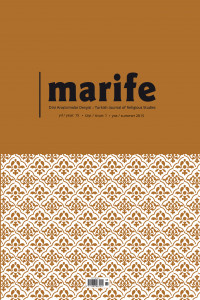Abstract
Sharh and Hashiya Historiography in the Ottoman Science Tradition -Evaluation of the Tafsir of Ahmad al-Karamani / His Hashiya on Zemahşeri- One must grasp the logic of the hashiya and sharh genre, to correctly decode the Ottoman scholarly tradition. This is due to the fact that the academic products in the field of Islam- ic sciences during the Ottoman period substantially consist of sharhs and hashiyas. When sharh and hashiya works are regarded as sole repetitions of the past knowledge, the ac- cumulation of five or six centuries of scientific advance would be regarded in advance as condemned. Whereas it is a better way to see these commentaries and hashiyas as works who apply analysis, criticism, comparison and judgments on founding texts whose compe- tence in their field has been assured. It would be a good start to enter Ottoman research life by thinking that what justifies these scholarly works is that via these works scientific continuity and vitality is provided and certain traditions are represented. It would end in better results if we look also at Tafsir works from this viewpoint. Indeed, the commentary belonging to Ahmad b. Mahmûd al-Karamânî which is a hashiya on al-Zamakhshari’s Tafsir, is one of the best examples of this powerful genre
Osmanlı İlim Geleneğinde Şerh ve Hâşiye Yazıcılığı -Ahmed el-Karamânî’nin Tefsiri/Zemahşerî Şerhi Örneği
Abstract
Osmanlı ilim geleneğinin kodlarını çözmek için öncelikle şerh ve hâşiye yazım türünün mantığını kavramak gerekir. Zira Osmanlı döneminde İslâmî ilimler sahasında verilen ürünler, önemli ölçüde şerh ve hâşiyelerden oluşur. Şerh ve hâşiyeler, geçmişin kuru bir tekrarından ibaret görüldüğü takdirde, beş altı yüzyıllık bir ilmî birikim peşinen mahkûm edilmiş olur. Hâlbuki şerh ve hâşiyeleri, kendi alanında yetkinliği kabul edilmiş kurucu bir metin üzerine tahlil, tenkit, mukâyese, muhâkeme gibi yöntemlerin uygulandığı eserler olarak görmek; bu çalışmalarla ilmî sürekliliğin ve canlılığın sağlandığını, belli geleneklerin temsil edildiğini, bunun da yapılan ilmî çalışmalara bir meşrûiyet kazandırdığını düşünmek, Osmanlı ilim hayatını araştırmaya giriş için iyi bir başlangıç olacaktır. Tefsir ilminde telif edilen eserlere de bu noktadan bakmak daha sağlıklı sonuçlar ortaya çıkaracaktır. Nitekim Ahmed b. Mahmûd el-Karamânî’ye ait olan tefsir / Zemahşerî şerhi, bu yazım türünün temsil gücü yüksek bir örneğini oluşturur
Details
| Primary Language | Turkish |
|---|---|
| Subjects | Religion, Society and Culture Studies |
| Other ID | JA74DS74PR |
| Journal Section | Research Article |
| Authors | |
| Publication Date | June 30, 2015 |
| Published in Issue | Year 2015 Volume: 15 Issue: 1 |
This work is licensed under a Creative Commons Attribution-NonCommercial 4.0 International License.

